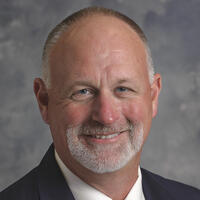RAYMOND, Miss. -- A large group of agricultural producers and industry professionals met with Mississippi State University personnel during the 2025 Central Mississippi Producer Advisory Council meeting Feb. 18 in Raymond at the Central Mississippi Research and Extension Center.
The annual forum provides clients, MSU administrators, researchers, specialists and Extension agents an opportunity to meet in small commodity groups to discuss the research and educational needs of producers in the region.
“We’re here today to make sure what we are doing is helpful and relevant to you,” said Curt Lacy, head of the Central Mississippi Research and Extension Center. “We want to give you the information you need to make informed decisions about your businesses and your lives. Today is one of the main ways we do that.”
The meeting was a collaborative effort between longtime partners Alcorn State University and Hinds Community College.
“One of the things that makes our region unique is all the different partners we have to work with here,” Lacy said. “We are the only research and Extension center located on the campus of a community college. We also have the opportunity to work with our colleagues in the ASU Extension Program. Both of those things give us some distinctive opportunities.”
Six commodities were represented: apiculture; small ruminants; forestry and wildlife; beef, forage and equine; agronomic crops and vegetables, fruits and nuts.
Apiculture representatives said they need more research on improved management of small hive beetles and more cost-effective techniques to manage varroa mites. They also would like Extension publications on proper and safe transport of honeybees and fall requeening techniques.
The small ruminant group asked for more education on mixed grazing of small ruminants and cattle, breeds of sheep that do well in Mississippi, meat markets and proper preparation of small ruminant meat. They also discussed the role of laparoscopic artificial insemination in embryo transfer. Leyla Rios, Extension small ruminant specialist and assistant professor in the Department of Animal and Dairy Sciences, announced that MSU is hosting the Small Ruminant Conference June 13-14 at the Mill in Starkville.
The forestry and wildlife group asked for continued research and educational programming on disturbance management activities of invasive species of wildlife, educational updates on forestry carbon sequestration and other market information. They discussed the continued support of the Christmas tree cultivar project and the partnership between MSU Forest Products Lab and School of Architecture. They want to see vacant wildlife and forestry Extension positions continue to be filled with professionals who are focused on landowners and producers. They also support a feasibility study of using forest products for future fuel production as a potential new market and rural community development.
Beef, forage and equine group members said they want information about increasing hay quality, cool-season grazing opportunities, roughage supplementation and ration development and formulation. They also would like to see increased funding for research. They also said they need information on long-term business planning and strategies for farm-to-table marketing and enterprise budgets.
Members of the agronomic crops group wanted continued evaluation of deer damage across all row crops, including information on damage ratings and control measures. They asked for information on how to mitigate low market prices by adjusting seed and fertilizer rates and options for corn resistance management.
Representatives of the vegetables, fruits and nuts group asked for programs and updated crop budgets to help new and experienced growers plan for profitability and sustainability, more education on marketing for local producers, more variety trials of key crops focused on production, pest management, etc. They also want updated publications with resources for improved, low-input and heirloom varieties.
Keith Coble, vice president of the MSU Division of Agriculture, Forestry and Veterinary Medicine, said this annual gathering is one of the most crucial events for both producers and MSU personnel.
“I don’t know of anything we do that is more helpful than this event. We want to understand what your problems and needs are. We can’t be the servants you need without your input, and I can look back and see the decisions and the hires we have made that are a direct result of the conversations from this meeting,” Coble said.
Extension’s educational efforts are also determined by Mississippians’ needs, and Extension agents are dedicated to delivering the university’s research-based information throughout the state.
“This year we have new initiatives and new programs that we will introduce, and those are the result of the input and ideas we hear from the people of this state every day and at this meeting,” said Angus Catchot, director of the MSU Extension Service.
Producers in the coastal region met Jan. 14, and northern region producers met Feb. 20.
Contacts
-
 Professor and Head
Professor and Head- Central MS Research & Ext Center
